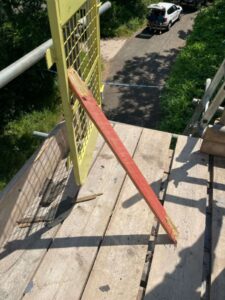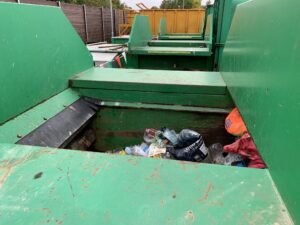CCTV captures moment welder crushed at Sunderland shipyard
CCTV has captured the moment a welder was crushed while working at a shipyard in Sunderland.
David Vinsome sustained multiple rib fractures as well as internal injuries, including an abdominal wall burst, following the incident at Pallion Shipyard on 18 October 2022.
The 37-year-old from North Shields was crushed between an excavation bucket and a fabrication table. Following an investigation by the Health and Safety Executive (HSE), Midland Steel Traders Ltd has been fined £100,000.
At the time of the incident, welders had been using an overhead gantry crane and a fork lift truck in tandem to rotate a large excavator bucket. David Vinsome was crushed as he attempted to attach the chains from the overhead crane to the bucket, and a fork lift truck started the lifting operation, unaware of his position behind it.
In a victim personal statement, the father-of-one, recalls how he spent nine days in hospital, before returning home.
“When I did come home, I was in bed for about a month before I tried to get down the stairs,” he said.
“My partner is a NHS nurse, so she helped a lot.
“I am still suffering a lot of pain with my shoulder. I have a daughter and I cannot do the school run anymore or take her out for meals or ice cream.
“I am worried about getting back to work. I don’t know when that will be or how I will manage.
“I don’t think I will go back to welding.”
The investigation by the Health and Safety Executive (HSE) found Midland Steel Traders Ltd had failed to ensure that the lifting activity was properly planned by a competent person, or carried out in a safe manner. They also failed to establish a safe system of work for this activity – leading to a breakdown of communication between the multiple operators involved.
HSE inspector Matthew Dundas said: “Lifting operations can often put people at great risk, as well as incurring great costs when they go wrong.
“It is therefore important to properly resource, plan and organise lifting operations so they are carried out in a safe manner.
“Had that been done in this case then Mr Vinsome wouldn’t have been so seriously injured.
“HSE provides detailed guidance on lifting operations including the importance on how they should be properly resourced, planned and organised, to enable them to be carried out in a safe manner.”
Midland Steel Traders Ltd, Portobello Ind Est, Shadon Way, Chester le Street, pleaded guilty to breaching the Sections 2(1) and 3(1) of the Health and Safety at Work etc. Act 1974. The company was fined £100,000 and told to pay £4,916 costs at Newcastle Magistrates Court on 13 February 2025.
This prosecution was brought by HSE enforcement lawyer Jonathan Bambro and supported by paralegal officer Melissa Wardle.
Further information:
- The Health and Safety Executive (HSE) is Britain’s national regulator for workplace health and safety. We are dedicated to protecting people and places, and helping everyone lead safer and healthier lives.
- More information about the legislation referred to in this case is available.
- Further details on the latest HSE news releases is available.
- HSE does not pass sentences, set guidelines or collect any fines imposed. Relevant sentencing guidelines must be followed unless the court is satisfied that it would be contrary to the interests of justice to do so. The sentencing guidelines for health and safety offences can be found here.
- HSE guidance on lifting operations including the importance on how they should be properly resourced, planned and organised, to enable them to be carried out in a safe manner, is available.







